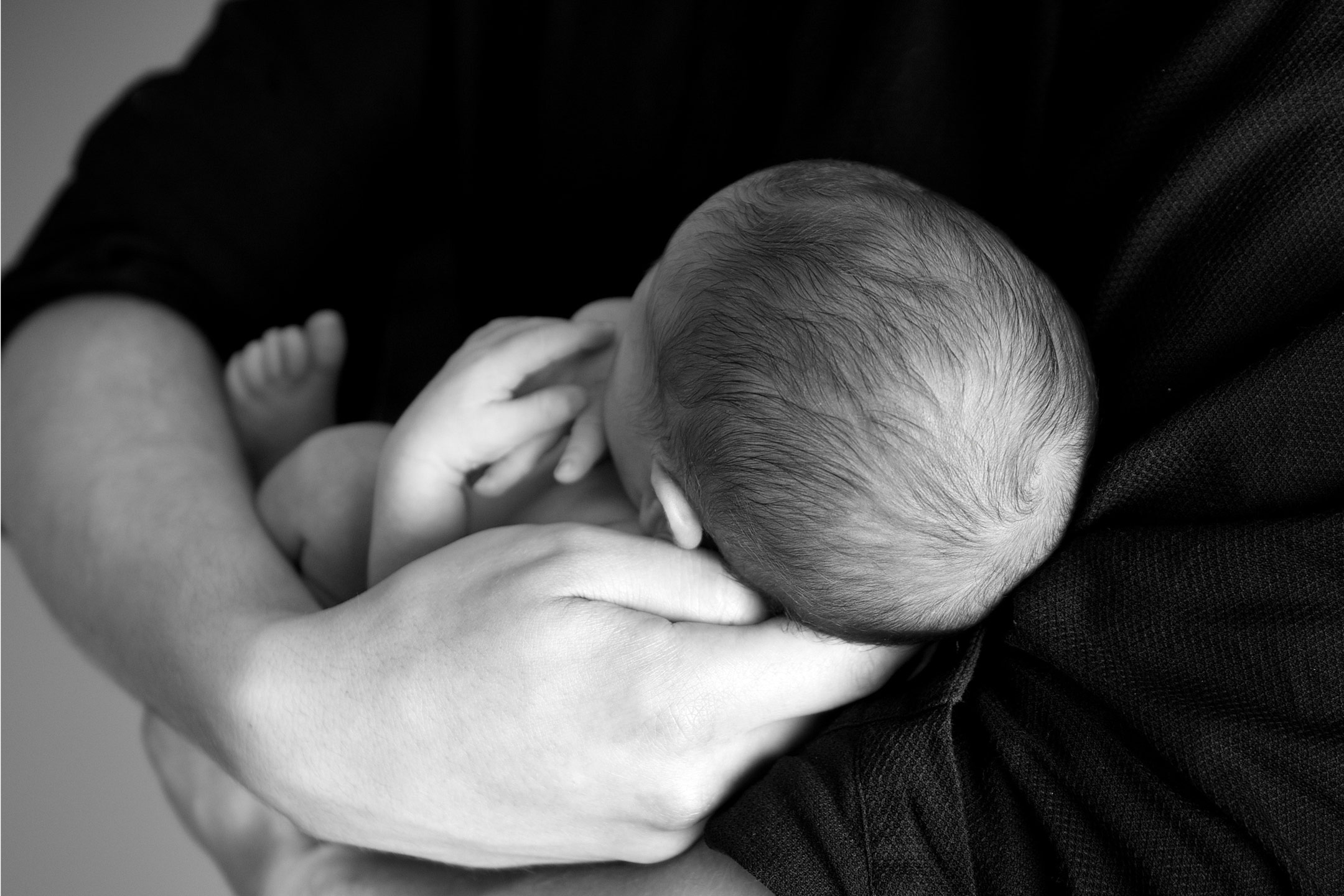
01 Sep Fatherhood in focus
Men’s feelings about fatherhood found new expression in a study into contemporary Australian parenting, write Marie Ann Nelson, Claire Halle and Kathy Hennessy.
“Don’t think you can cope … you can’t. Don’t think you can keep your old life … you won’t. Hope that when he smiles at you for the first time, your life lights up. I know mine did.”
These sentiments are from one of about 300 fathers who shared their feelings about fatherhood in the first three months of their babies’ lives in a survey for an ongoing research project funded in 2007 by the Royal Children’s Hospital Foundation, Brisbane.
These and many other thoughts expressed by participating dads challenge the historic, stereotypical view of the Australian male attitude towards fatherhood.
It is widely recognised that much has changed in terms of a father’s physical involvement in the birth and parenting role. Most dads are involved in antenatal preparations, attend the births of their children and assist with infant care. Despite this, men have predominantly remained guarded about outward displays of emotion or publicly discussing their true feelings about the life-changing phenomenon of becoming a father. Traditionally, acceptable expressions of emotion begin with congratulatory slaps on the back from a new father’s mates while he is “wetting the baby’s head” after the birth, and end with him moaning about the lack of sleep or sex he is getting.
Proof that this is changing is evident in the very high voluntary return rate of questionnaires from fathers, and the honesty and passion apparent in their responses. As part of our collaborative research project, ‘Parental attitudes and practices: settling infants under 12 weeks of age’, parenting questionnaires were offered to both mothers and fathers in the antenatal period and in the first 12 weeks after birth. The questionnaires were distributed almost exclusively through the mother, and yet the return rate was 43 per cent from the fathers and 57 per cent from the mothers. This clearly demonstrates that today’s fathers want their voices heard on the issue of parenting infants.
So what did they say?
The questionnaires were lengthy and complex and required the respondents to truly examine their innermost thoughts and feelings. Meeting this challenge is further proof that dads really want to express what early parenting is like for them. Several key issues were identified in the fathers’ responses, including whether or not men feel adequately prepared for fatherhood, their level of emotional involvement with their new infant, and the impact of a new baby on their relationships with their partners.
Preparing to be a father
One of the first issues broached was how prepared men felt for becoming a father. It’s probably fair to say that women surrender gradually and progressively to motherhood, in response to the myriad physical and emotional changes that occur, whether they initially feel ready or not. Although men are aware of the unfolding circumstances, for most there is generally a more sudden realisation of the new identity of fatherhood. It is not until the birth is imminent or they are cradling their little one that the emotional realities register. Evidence for this emerged through the 40 per cent of dads who indicated that they felt quite limited in their preparation for fatherhood and the 10 per cent who felt totally unprepared. Although many men attended antenatal classes, they differentiated between being prepared for the birth and the steep learning curve of caring for a young baby. One dad expressed it this way: “Practical advice on settling and sleeping was hard to come by. Antenatal classes were of no help.” Related to this issue was the finding that one in four dads stated that they wished they had more experience with babies before they became parents. Interestingly, how prepared a father was had no bearing on how confident he felt in handling his baby. Ninety per cent of dads described feeling confident in this area.
Even though 20 per cent of men stated that their partner’s pregnancy was unplanned and that they had mixed feelings or were shocked by the announcement, more than 95 per cent of dads said they had no regrets about becoming a father. In fact, about four out of every five dads reported that having a baby has made them feel more fulfilled. The majority of fathers believed that they were developing a strong bond with their baby. This is a very encouraging finding considering that the survey dealt with the first 12 weeks of life, and goes against the widely held belief that it’s often not until the infant is more interactive that fathers start to feel strongly attached to their baby.
A high proportion of dads also said they looked forward to seeing the baby when they came home from work, although 40 per cent acknowledged the difficult days, with sentiments such as: “It was really hard for me to cope with a crying baby. I work long hours and when I got home she was always crying and I thought she didn’t like me. Also, I couldn’t settle her.” In contrast, other dads made comments like, “I am so pleased that I attend to Samuel as soon as he cries so that he can feel secure knowing that he is being listened to and heard when he communicates in the only way he knows how with me.”
Of course there were also dads who reverted to our national sense of humour to vent their emotions: “Where can you remove the batteries?”
Fathers openly revealed their true feelings
Whether comments appeared positive or negative was not an issue in this study; the important factor was that fathers were openly revealing their true feelings. They were sensitive to the emotion involved in the tasks they were performing with their child and the impact on their developing relationship. This was affirmed by the fact that one-third of fathers expressed a concern that they were “so stressed that it was a bad influence on the baby”. They recognised that their own feelings and behaviours impacted on their infant and wanted to protect their baby.
In some ways, it seemed that fathers have too high expectations of themselves, because one-quarter of them described feeling that they “should” be enjoying their baby, but that at times they weren’t. The survey showed that there were 10 to 15 per cent of dads who were consistently experiencing emotional distress in many aspects of the fathering role. These fathers were sincerely endeavouring to be good dads, and were judging themselves harshly. This was obvious from one example of a dad’s comment: “Try as I might … I cannot successfully achieve any results. How upset my failure at doing so makes me. How emotionally drained I feel.”
What advice would you give to other fathers?
When asked what advice they would give other fathers, many dads made comments like: “Be patient and don’t stress out. Baby can sense that and it makes things harder… Give them lots of love/play with them/talk to them and treat them as little people – best of all try to have fun and enjoy them.” Overall, there were many positive expressions of the joys of fatherhood. These showed a healthy outlook for Australian dads becoming involved with their children in a nurturing and emotionally available way.
In response to questions in the survey relating to who fathers feel supported by and where they look for support, fathers indicated that they were very well supported, both physically and emotionally, by their partner in the parenting role. This was closely followed by positive feelings of being supported by family and friends, and then moderately by health professionals. Of some concern was the finding that one in five dads said that they were “never” able to talk with other fathers. Compounding this, another 40 per cent indicated they were very limited in their ability to do so. Many questions are raised as to why they felt this way, since the respondents were fathers from the suburbs, so were not geographically isolated. Was it lack of opportunity due to the pace of life as a working dad with a young baby? Did it relate to the traditional Australian male culture that discourages personal communication with other men? This is an issue that will be explored in a further study.
Along with the finding that dads felt well supported by their partner, two-thirds believed strongly that parenting had brought them and their partner closer together. The remainder agreed that “sometimes” they felt this way. Such reservations are consistent with the challenges and sleep deprivation of the early months of parenting. This period can be a very testing time in a relationship – for example, when working dads come home at the end of the day, and their partner has been dealing with an unsettled baby alone all day. Both parents have valid needs and are feeling stressed by their individual circumstances. Without some negotiation and calm communication, this is a potentially divisive situation. Survey findings focusing on the after-work period reinforce this. We have already established that a significant proportion of dads found it difficult to cope with the baby when they came home from work. Couple with this the finding that two-thirds of fathers believed that their partner “expected” them to care for the baby when they got home, and you can understand that emotions sometimes simmer over.
Interestingly, two-thirds of dads said they frequently liked to take the baby so that their partner could do something for herself. The other third indicated they also liked to do this, but less regularly.
50% commented that their relationship had changed
Fifty per cent of fathers indicated they feel their partner no longer gives them “attention”. What is meant by this statement is subject to interpretation. However, one dad’s comment under the category Parenting Problems that his “sex life decreased”, captures a sentiment expressed by several fathers.
Fatherhood is being increasingly researched because society is now realising the enormous influence the fathering role has both on the family and the community at large. Children who have an involved father have been shown to have higher academic achievement and fewer incidences of such issues as low self-esteem, delinquency, crime, substance abuse, sexual precocity and depression.
Watching a father lovingly interacting with his baby is a powerful thing, and enhances the sense of his masculinity for many women. So the ‘blokey’ image of Aussie fatherhood is still intact. Yes, dads still complain about the lack of sleep and sex, but they express more about their relationship with their baby and how the fathering role feels for them. This acknowledgement of their own feelings is an important step in valuing the role of fatherhood for themselves and the broader community.
Marie Ann Nelson, Claire Halle and Kathy Hennessy are clinical nurses




